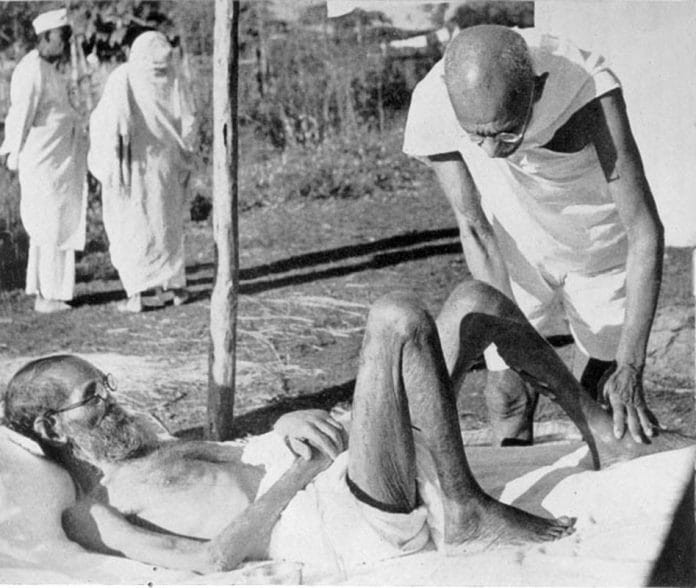A special edition of the Indian Journal of Medical Research will highlight Gandhi’s healthy lifestyle and the household remedies he used.
New Delhi: Health experts are looking to invoke the frugal, nature-reliant life of Mahatma Gandhi to project him as the new fitness icon of an India grappling with a growing lifestyle disease burden.
The Indian Council of Medical Research (ICMR) is releasing a special edition of the Indian Journal of Medical Research, titled Gandhi and Health at 150, Role of ICMR, with one chapter dedicated to his health.
“He had high blood pressure, for which he would take garlic and sarpargandha (a herb called Indian Snakeroot),” ICMR director-general Dr Balram Bhargava told ThePrint.
“He was a healthy man. He exercised, walked and was a minimal eater. He did not eat fried food,” said Dr Bhargava.
Also read: Mahatma Gandhi’s little-known love affair with a married, progressive woman in Lahore
“He was practising a lifestyle which we (doctors) all advocate,” he said.
ThePrint accessed the Gandhi’s health reports at the National Gandhi Museum.
Gandhi had a personal sphygmomanometer, the instrument to measure BP, and also consumed tukmaria, or basil seeds, among other herbal remedies.
Tukmaria is used to reduce body heat, relieve constipation and bloating, treat acidity and heartburn, and reduce blood sugar levels.
He was also particular about his oral hygiene and used a self-made powder to clean his teeth.
Disease burden
Bhargava said the purpose of promoting Gandhi’s lifestyle was to address India’s struggle with hypertension, diabetes, strokes, and other lifestyle diseases.
According to the National Family Health Survey 2015-2016, roughly one in 10 women and one in seven men aged 15-49 years were hypertensive. Furthermore, the World Health Organisation estimates that 8.7 per cent of India’s population is diabetic.
According to a report in Down to Earth on a series of studies published in The Lancet and associated journals, heart disease and strokes contributed to 28.1 per cent of the total deaths in India in 2016.
Another facet of Gandhi’s life inspiring the special edition is the Dandi march of 1930, when he led a 390-km citizen march to protest against the high tax imposed on the kitchen staple by the British.
“When he took out the Dandi march, he talked about ‘muthi bhar namak se desh bhar namak (sic)’. We are taking a cue from it and saying ‘chutki bhar namak se BP se azaadi’.”
The idea is to drive home the importance of regulated salt intake.
For the special edition, the ICMR has collected information from various sources and studied his medical reports at the National Gandhi Museum.
“We looked at the electrocardiogram (ECG), blood pressure records, and details of his other operations, which we will summarise and produce,” Dr Bhargava said. “We are looking at his health reports, which say he had some surgeries.”
Mahatma Gandhi underwent two surgeries – for piles (1919) and appendicitis (1924) – during his fight for Independence, and also battled malaria in 1936, which cost him two teeth.
Also read: Mahatma Gandhi hated movies, but watched 2 in his lifetime
The director-general of the ICMR has also requested the National Gandhi Museum to allow them to study the blood-stained clothes Gandhiji was wearing on the day of his assassination on 30 January 1948.
The museum has a sample of the blood-stained clothes, including the dhoti and shawl, as well as one of the three bullets fired into him.
His service to the disease-hit
A major focus area of the journal’s new edition will be Gandhiji’s service for those suffering from different diseases, including leprosy, and how he provided the vision for work to treat them.
“It (the journal) will talk about Gandhi and tuberculosis and the National Institute of Tuberculosis, Gandhi and unsafe water and the National Institute of Cholera, and Gandhi and leprosy and the National Institute of Leprosy,” said Dr Bhargava.
“He advocated, worked and stood against tuberculosis and… leprosy,” he added. “We have taken the history of these institutes and how they were established on the principles of Gandhi to tackle those diseases,” Bhargava said.






